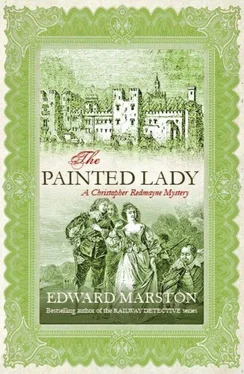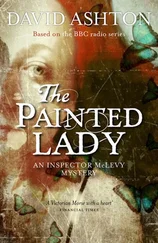Edward Marston - The Painted Lady
Здесь есть возможность читать онлайн «Edward Marston - The Painted Lady» весь текст электронной книги совершенно бесплатно (целиком полную версию без сокращений). В некоторых случаях можно слушать аудио, скачать через торрент в формате fb2 и присутствует краткое содержание. Год выпуска: 2011, ISBN: 2011, Издательство: Allison & Busby, Жанр: Исторический детектив, на английском языке. Описание произведения, (предисловие) а так же отзывы посетителей доступны на портале библиотеки ЛибКат.
- Название:The Painted Lady
- Автор:
- Издательство:Allison & Busby
- Жанр:
- Год:2011
- ISBN:9780749010324
- Рейтинг книги:3 / 5. Голосов: 1
-
Избранное:Добавить в избранное
- Отзывы:
-
Ваша оценка:
- 60
- 1
- 2
- 3
- 4
- 5
The Painted Lady: краткое содержание, описание и аннотация
Предлагаем к чтению аннотацию, описание, краткое содержание или предисловие (зависит от того, что написал сам автор книги «The Painted Lady»). Если вы не нашли необходимую информацию о книге — напишите в комментариях, мы постараемся отыскать её.
The Painted Lady — читать онлайн бесплатно полную книгу (весь текст) целиком
Ниже представлен текст книги, разбитый по страницам. Система сохранения места последней прочитанной страницы, позволяет с удобством читать онлайн бесплатно книгу «The Painted Lady», без необходимости каждый раз заново искать на чём Вы остановились. Поставьте закладку, и сможете в любой момент перейти на страницу, на которой закончили чтение.
Интервал:
Закладка:
‘I bear tidings,’ he announced.
‘We have already heard them, Elkannah,’ said Sir Willard.
‘I think not.’
‘Henry has just been apprised of the information. Araminta’s portrait is being painted by that creeping Frenchmen, Villemot.’
‘Is that the sum of your intelligence?’ asked Prout.
‘Yes.’
‘Then you know only half the news.’
‘There’s more to add?’
‘Much more — though I suspect that Henry already knows it.’
‘Not I,’ said Henry, feigning ignorance.
‘Your brother must surely have told you.’
‘Christopher and I rarely speak, Elkannah.’
‘That’s not true,’ said Prout. ‘You are always trying to borrow money off him to settle your gambling debts. Something as important as this would hardly go unmentioned.’
‘Something as important as what?’ asked Sir Willard. ‘I am still in the dark here. Pray, shed some light, one of you.’
‘Jean-Paul Villemot is having a house built in London.’
‘He’s rich enough to afford it.’
‘He’s also astute enough to choose a talented architect. The fellow goes by the name of Christopher Redmayne.’
Sir Willard goggled. ‘Henry’s brother?’ he said, understanding the situation at once. ‘But that means he will have an excuse to call on Villemot at any time. He could devise a way to meet Araminta.’
‘It would never cross his mind,’ said Henry.
‘It would cross your mind.’
‘That’s a gross slander, Sir Willard. I abide by the rules of the Society. The four of us fight on equal terms. I would never stoop to subterfuge in any way,’ he lied, bristling with righteous indignation. ‘I had no knowledge of the fact that Christopher had been engaged by the artist and would never use him to further my ends. Were I to attempt such a thing, he would reject the notion outright. My brother is no puritan but neither does he take any delight in the chase. The mere whisper of what our Society was about would discountenance Christopher. He believes in love and marriage.’
‘So do I,’ said Sir Willard, ‘when occasion serves. But I still fear that you may have stolen a march on us, Henry. If your brother calls on Villemot while that Jewell among women is there, he will be able to bring back gossip about her that only you will hear.’
‘Christopher is not given to passing on gossip.’
‘I agree,’ said Prout. ‘I’ve met him. Henry’s brother is a decent, honest, conscientious young man and, unless I am mistaken, he has another glaring defect — he is a devout Christian.’
‘That’s true, Elkannah. Our father is forever holding Christopher up as an example to me. My brother leads a good life while I prefer to lead an adventurous one.’
‘If you want someone to worry about, Sir Willard, it is not him. The real danger comes from within the Society.’
Sir Willard was puzzled. ‘How can that be?’
‘The person to watch is Jocelyn.’
‘Why — what has he been up to?’
‘Telling the truth,’ said Prout, ‘and it unnerved me. When we heard that Araminta had been married, all of us were shaken to the core but we three have at least accepted the situation and determined to make the best of it. Jocelyn will not accept it.’
‘He must,’ said Henry.
‘Facts are facts,’ added Sir Willard. ‘Araminta will not divorce her husband for our benefit.’
‘More’s the pity!’
‘Jocelyn wants to effect his own divorce,’ said Prout. ‘We spent last night together and I saw him in his cups. I’ve never known him so roused and belligerent.’
‘What did he tell you?’
‘That he’ll not let anyone stand between him and Araminta. He’s set his heart on winning her love. Jocelyn told me that his mind is made up. If he cannot enjoy her favours by fair means, he’ll not scruple to resort to foul ones. His meaning was clear,’ warned Prout. ‘To achieve his ambition, he’s even prepared to murder Sir Martin Culthorpe.’
When she was finally released from the long morning session in the studio, Araminta Culthorpe was grateful. She was not merely spared the discomfort of sitting in the same position for an hour at a time, she was liberated from the searching gaze of Jean-Paul Villemot. The artist did not upset her again with any suggestive remarks but she no longer felt completely safe in his presence. Their relationship had subtly changed and Araminta needed to get away in order to examine the changes from a distance. As the carriage bore her back home to Westminster, she reflected on what had happened and speculated on what might come at a future meeting.
The problem confronting her was simple. Should she or should she not confide in her husband? And if so, what exactly should she tell him? Araminta could hardly say that she felt threatened in the artist’s company because that was not true. In essence, all that had happened was that he had made some inappropriate comments. Other ladies would no doubt have accepted them as compliments but, as a young woman newly married, she had been somehow unable to do so. She had felt vulnerable. Jean-Paul Villemot, in her opinion, had overstepped the bounds of propriety.
What she had to calculate, she decided, was her husband’s reaction. If she told him that she had been offended by the artist’s behaviour, he would cancel the portrait at once and engage someone else to paint it, and Araminta did not believe that anyone in London could rival Villemot. If, on the other hand, she made only a minor complaint, Sir Martin would feel obliged to challenge the artist and that, too, could result in the abandonment of the project.
However she presented it to him, Sir Martin would be hurt and she wanted to spare him any pain. For that reason, she resolved to sort out the matter herself without involving him in any way. After all, Araminta consoled herself, there would be no more sittings to endure. Unless he called her back, she and Villemot might never be alone in the same room again.
Having reached her decision, she felt much better. Her only concern now was to change out of the dress she had worn at the studio, ideal for the painting but not entirely suitable for a warm day in May. It was something she was more likely to wear to a formal event than put on at home for the day. When the carriage delivered her to her front door, she rang the doorbell. It never occurred to her that she was being watched by someone who stood on the opposite side of the road, partly concealed behind a tree.
Let into the house, Araminta went straight upstairs to change with her maid on her heels. Eleanor Ryle was pleased to see her mistress return. A bright, open-faced, inquisitive young woman with a mop of brown hair, Eleanor helped her out of her dress.
‘Monsieur Villemot chose well,’ she said, stroking the material. ‘This has always been my favourite.’
‘Then you may get a chance to wear it, Eleanor.’
‘Me, m’lady?’
‘Monsieur Villemot does not need to keep me sitting there for hours while he paints the dress,’ said Araminta. ‘Someone else can wear it in my stead and he suggested you.’
‘But he doesn’t even know that I exist.’
‘Yes, he does. He noticed you when he called here.’
Eleanor giggled. ‘Really?’
‘He thought that the dress would fit you perfectly.’
‘Oh, I could never wear it as you do, m’lady. It becomes you. On me, it would not look the same at all.’
‘I wonder,’ said Araminta, weighing her up. ‘Let me see. Hold it against you, Eleanor.’
‘Yes, m’lady.’
Taking a step back, the maid held the dress up against her, grinning happily as she did so, as if a private dream was just being fulfilled. Eleanor was short enough and slim enough to wear it even though the dress was not the ideal colour for her. Araminta studied her for a full minute.
Читать дальшеИнтервал:
Закладка:
Похожие книги на «The Painted Lady»
Представляем Вашему вниманию похожие книги на «The Painted Lady» списком для выбора. Мы отобрали схожую по названию и смыслу литературу в надежде предоставить читателям больше вариантов отыскать новые, интересные, ещё непрочитанные произведения.
Обсуждение, отзывы о книге «The Painted Lady» и просто собственные мнения читателей. Оставьте ваши комментарии, напишите, что Вы думаете о произведении, его смысле или главных героях. Укажите что конкретно понравилось, а что нет, и почему Вы так считаете.












